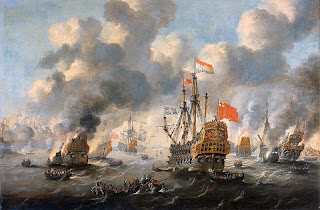Showing posts with label Charles II. Show all posts
Showing posts with label Charles II. Show all posts
Saturday, 24 June 2017
The two battles of the Medway: two British military disasters
Drawing heavily on my book Britain's 20 Worst Military Disasters (The History Press), Forces Network's new account of these two two battles of the Medway can be found at http://www.forces.net/news/money-root-all-evil-and-defeat
The first in AD43 was the decisive battle of the Roman conquest, happening somewhere near where the M2 bridge now crosses the river. It may well also have been one of the two biggest battles ever fought on British soil
After two days of fierce fighting (highly unusual in those days), the Romans managed to force their way across the river. British resistance continued for a time, but soon the Emperor Claudius was able to take the surrender of eleven British kings.
The second in 1667 saw the Dutch sail up the Medway and burn the British fleet. An important factor was a government austerity programme that saw sailors left unpaid, though there seemed to be plenty of money for King Charles II's mistresses.
For the full story, see my book Britain's 20 Worst Military Disasters. See also my posts of 14 and 23 November 2011.
Friday, 21 April 2017
The power of lying. The Popish Plot Part 2
For part one, see my post of
yesterday.
When Titus Oates presented his ‘evidence’
to the Privy Council, King Charles II tore it to shreds, but Oates had the
support of the London mob, and standing up to him publicly - that was quite another matter. It would have caused an almighty row.
So the king did nothing to save
from execution at least 15 people he must have known to be innocent, while
Oates was heaped with honours and money.
But gradually people became more and more sceptical about Oates' claims, and in 1681 Charles had
him arrested and imprisoned. And when the king was succeeded by his brother, the
Catholic James II, who Oates had denounced, the perjurer was imprisoned for
life, put in the pillory and whipped through the streets of London.
The story was not quite over,
though. When James was deposed by his daughter Mary and his son-in-law, William III,
Oates was pardoned, released and given a pension.
Labels:
Brexit,
Charles II,
England,
fake news,
James II,
lies,
Popish Plot,
propaganda,
Titus Oates,
William III
Thursday, 20 April 2017
The power of lying. The Popish Plot Part 1
Some of the Brexit strategists and
bankrollers think they are awfully clever to have conned people into supporting
them by a campaign of mendacity and deceit, but actually there’s nothing new
about lying in order to achieve a political objective, even in England.
Back in 1678, Titus Oates (pictured) was in a
tight corner. His cv included being expelled from school, failing to get a
degree at Cambridge, then falsely claiming he had one to get ordained as a Church of England priest. Next he had lied about a schoolteacher whose job he wanted, accusing
him of sodomy.
This time Oates got arrested for
perjury, but he escaped and in 1675 managed to get a job as a ship’s chaplain.
The following year he was sacked for buggery, and arrested again for perjury,
but managed to escape again.
Next he tried his hand at becoming
a Catholic priest, but got expelled from three different seminaries. What on
earth was he to do? Oates decided to turn to the thing he did best. Lying. In
September 1678, he concocted fake news on a heroic scale, claiming there was a huge foreign-backed Roman Catholic plot, involving hundreds of
priests and nobles.
They were planning a Catholic takeover of England while the Queen’s doctor and her sister-in-law’s secretary were to assassinate King Charles II.
To be continued…………….
Labels:
1678,
Brexit,
Charles II,
deceit,
fake news,
lies,
lying,
Popish Plot,
propaganda,
Titus Oates
Wednesday, 23 November 2011
Britain's 20 Worst Military Disasters 7 - The Second Battle of the Medway
In 1667, England was in the middle of an austerity programme. Tax receipts had been hammered by two major disasters, the Great Plague of 1665 and the Great Fire of London of 1666. One government cut involved laying up the Royal Navy’s great ships, and paying off most of their crews.
Unfortunately, there was a war with the Dutch going on at the time, and at the beginning of June, their commander, Admiral De Ruyter, detached a task force from his fleet with the mission of attacking the pride of the navy in the Medway.
The English had sunk ships in the river, and stretched a chain across it, and they had guns ashore to stop the progress of the enemy, but unfortunately there was a shortage of gunners, supplies had been pilfered, and the Dutch came on regardless.
They set three warships alight, and captured and took away two others, including the 82-gun Royal Charles – the pride of the navy, the ship that had brought Charles II back from exile. It was, considered the diarist John Evelyn, ‘a dishonour never to be wiped off’, and was perhaps Britain’s greatest ever naval humiliation.
Labels:
1667,
battle,
Charles II,
De Ruyter,
Great Fire,
Holland,
John Evelyn,
London,
Medway,
Netherlands,
plague,
Royal Charles,
Royal Navy
Subscribe to:
Posts (Atom)




